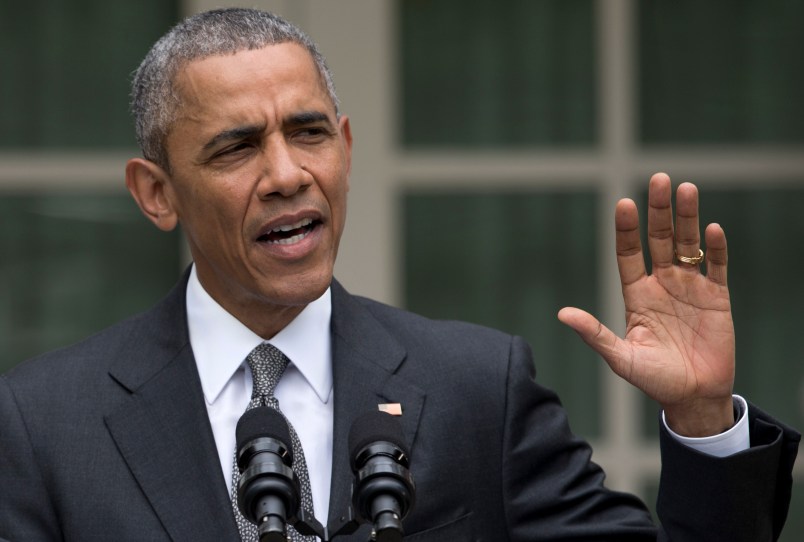When President Barack Obama signed the Trade Promotion Authority bill last week, he set a precedent. The bill included a provision that “requires the U.S. Trade Representative to discourage European Union countries from boycotting ‘Israel or persons doing business in Israel or Israeli-controlled territories’ during free-trade negotiations between the U.S. and the EU.”
In effect, this amendment treated Israeli settlements, for the first time in American history, as being part of Israel and therefore deserving the same protections. It was a small step; there is no enforcement mechanism in the bill. However, it cracked the dam and opened the potential for a flood. This small amendment was a first step in reversing longstanding American opposition to the settlements, and its support for the two-state solution.
Despite this provision, Obama signed on the dotted line, not wanting to endanger a bill he fought long and hard to see pass. But now that it is law, Obama (through the State Department) has taken a stand. In fact, what once seemed to be a leap toward legitimizing the settlements now stands to be turned on its head, with the State Department making it clear that boycotts of settlement products do not merit American opposition.
“The United States government has … strongly opposed boycotts, divestment campaigns, and sanctions targeting the State of Israel, and will continue to do so,” State Department spokesperson John Kirby said in a statement. “However, by conflating Israel and ‘Israeli-controlled territories,’ a provision of the Trade Promotion Authority legislation runs counter to longstanding U.S. policy towards the occupied territories, including with regard to settlement activity.”
Kirby also pointed out on Twitter that every U.S. administration since 1967 has opposed settlements, and recognized that settlements make a two-state solution harder to achieve. “The U.S. government has never defended or supported Israeli settlements and activity associated with them and, by extension, does not pursue policies or activities that would legitimize them,” he said. “We will also continue to uphold policies integral to preserving the prospect of a two-state solution to the Israeli-Palestinian conflict.”
The resolution, which the influential American-Israel Public Affairs Committee (AIPAC) pushed hard for, was a transparent attempt to blur the lines between Israel and the settlements. However, now that the administration has made it clear it does not accept the conflation of Israel and the settlements, the effect of the action is precisely the opposite. The United States has now clarified that distinction and made it clear that, while it will enthusiastically defend Israel’s security, it will not extend that protection to the settlements.
The administration’s statement also sends a very clear message to supporters of a two-state solution in the United States: The settlements are still fair game. And it is a game we need to finally get into.
The same day Kirby made his statement, the United Church of Christ voted to divest its holdings from companies that are profiting from the Israeli occupation of Palestinian territories.
Yet, that same resolution called for nothing more than advancing the goals of ending the occupation. It was carefully designed not to target companies doing business inside Israel proper. So this could have been a victory for moderate peace groups and supporters of a two-state solution. Yet despite a few calls from pro-Israel, pro-peace groups to boycott settlements, most such groups shy away from any kind of economic action. In their fear of being associated with the BDS movement, they abdicate these victories to that very movement, thereby strengthening it.
Now, the Obama Administration is telling us in no uncertain terms that boycotts of settlements are perfectly kosher. It is time to make the call loud and clear: The settlements are illegal. They are not Israel and are not entitled to the same legitimacy that Israel is rightly due. They are, in fact, a serious threat to Israel’s future even as they undermine its moral foundations in the present. The best way to defend Israel against attempts to de-legitimize it is to affirm the illegitimacy of the settlements and thereby strengthen Israel’s legitimacy within its internationally recognized borders. Those who are interested in a better future for both Israel and the Palestinians can accomplish this by simultaneously boycotting settlements and supporting businesses in Israel that do not cross the Green Line into the West Bank.
Strengthen Israel by weakening the settlements that divert enormous resources from the country that needs them. Strengthen it by proclaiming loudly that the occupation that undermines Israel’s security and that provides fodder for its enemies is unjust and must end. Strengthen it by naming the settlements the illegal and provocative enterprise they are and by demonstrating with dollars, not just words, our opposition to them. Once that is done, negotiations to make Israel’s borders permanent, with whatever mutually agreeable adjustments need to be made, alongside a Palestinian state become a much more realistic possibility.
Mitchell Plitnick is Program Director at the Foundation for Middle East Peace. Previously, he was Director of the US Office of B’Tselem: The Israeli Information Center for Human Rights in the Occupied Territories (2008-2010) and Director of Education and Policy for Jewish Voice for Peace (2002-2008).







In a word - good.
has Michael Oren wet his pants yet trying to get an op-ed into the NYT decrying the lack of Israeli support from the Obama administration?
It always confounds me how Israel itself has declared the settlements illegal out of it’s legal apparatus, while at the same time providing material support for initiation and expansion of the selfsame settlements.
After Yitzhak Rabin’s assassination, it was Ariel Sharon’s support and a special event he held at the Temple Mount that helped spark the Second Intifada, which only accelerated the settlement process.
Great piece - thanks.
Mr. Oren has had brown wet socks…since being replaced as ambassador. Thank you Mr. President…for reversing the dubious ‘work’; of the gop bags, dual passport, and aipac interference!